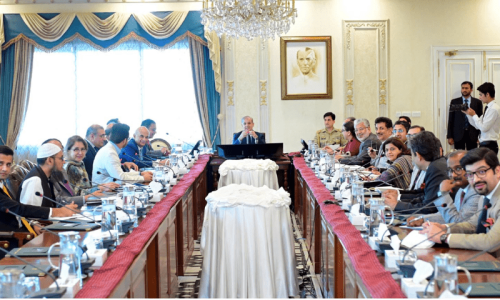
ISLAMABAD: Foreign Minister Shah Mehmood Qureshi on Monday underscored Pakistan government’s convergence with Saudi Arabia’s position on ‘regional issues’ as his Saudi counterpart Adel al-Jubeir denounced the Iranian government as “chief sponsor of terrorism”.
The two were speaking at a joint press conference at the Foreign Office on the visit of Saudi Crown Prince Mohammad bin Salman.
“As far as regional issues are concerned Pakistan and Saudi Arabia have commonality of views on host of issues and we have worked closely together in the past and Insha Allah will continue to do so in the future,” FM Qureshi said while responding to a question at the presser.
Mr Jubeir had immediately before the question (to which Mr Qureshi responded) given a lengthy statement on Iran accusing it of terrorism. “Iran has been, since the revolution of 1979, chief sponsor of terrorism. Iran established terrorist groups such as Hezbollah in Lebanon and Houthis in Yemen. Iran has been implicated in terrorist attacks in South America, in Europe and in Saudi Arabia. Iran has been implicated in smuggling explosives and weapons to terrorist groups,” he alleged.
Adel al-Jubeir calls Iranian govt ‘chief sponsor of terrorism’
The Saudi foreign minister further accused Iran of “interfering in other countries”, providing logistics to terrorist groups, and “harbouring board of directors of Al Qaeda, including Osama bin Laden’s son since events of 9/11”.
He believed that the Iranian government was facing domestic pressures because of internal problems and was trying to externalise those issues.
Last week 27 guards belonging to Islamic Revolution Guards Corps (IRGC) were killed in a suicide attack on the bus in which they were travelling in its Sistan-Baluchestan province bordering Pakistan. Iran’s supreme leader Ayatollah Ali Khamenei blamed the attack on “the spy agencies of some regional and trans-regional countries”.
IRGC Commander Major General Mohammad Ali Jafari was, however, more specific as he pointed fingers at Saudi Arabia and the United Arab Emirates. “The Saudi and UAE governments, which have secretly supported these anti-revolutionary and dangerous anti-Islam elements should know that Iran’s patience is not without limits,” he had said at the funeral of the slain soldiers.
Gen Jafari had also accused Pakistan of turning a blind eye to the alleged sanctuaries of terrorist groups involved in attacks on Iran. He had warned that in case Pakistan failed to act against those sanctuaries, Iran “based on the international laws, has the right to counter the threats in the neighbouring countries and will punish the terrorists that are the mercenaries of regional and extra regional intelligence services”.
Mr Qureshi, had in response to an earlier question, recalled his conversation with Iranian Foreign Minister Javad Zarif on the attack on Sunday in which he said he sought proofs from Iran about attack originating from Pakistani soil. “If they have evidence, they can share with us,” he stressed.
The Pakistani foreign ministry in an implied reference to Gen Jafari’s threat of action against the alleged terrorist sanctuaries said: “We respect their sovereignty and territorial integrity and I’m sure they will respect ours.”
Bilateral cooperation
Both foreign ministers spoke at length about the planned $20 billion Saudi investment in Pakistan and the Saudi-Pakistan Supreme Coordination Council, which has been agreed for overseeing the implementation of the agreements according to the decided timeline.
The multi-tiered coordination council has 10 joint working groups comprising officials and technical experts, which will meet quarterly, a ministerial council that would convene bi-annually, and an annual summit.
Mr Jubeir said Saudi Arabia had “strategic interests” in Pakistan and desired to “institutionalise the (bilateral) relations across the board” by setting up the Supreme Coordination Council.
Mr Qureshi said that the council had wide “scope and ambit” covering “trade and investment, energy, security, defence, and intelligence sharing”.
The Saudi foreign minister, while responding to a query, said Saudi Arabia’s objective behind the investment was to “participate in Pakistan’s growth”. He said the commitment made by the Kingdom was “not a charity, but an investment”. He maintained that the two countries would mutually benefit from the investment.
He further emphasised strong security, military to military, and counter-terrorism cooperation.
Published in Dawn, February 19th, 2019














































Dear visitor, the comments section is undergoing an overhaul and will return soon.